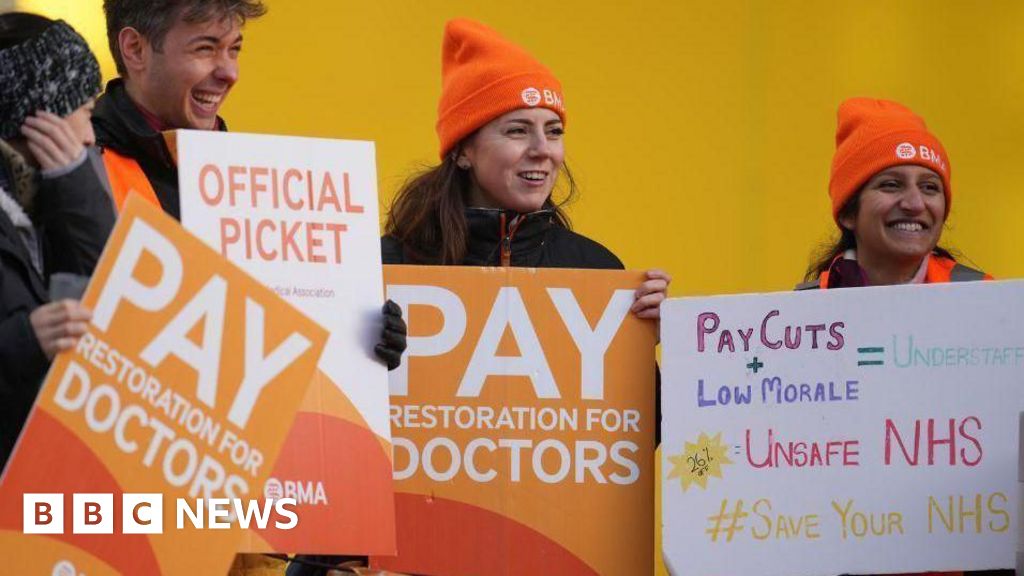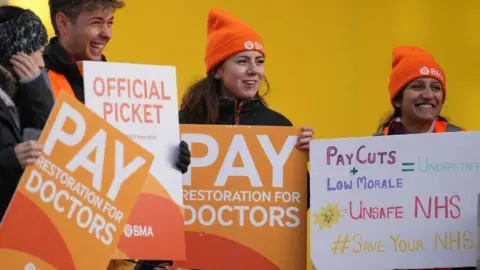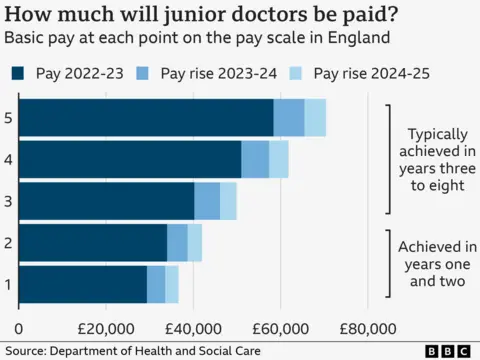Junior doctors want more despite backing pay deal

 PA Media
PA MediaJunior doctors in England have accepted the government’s offer of a 22% pay rise, but warn they will want more in the coming years.
Members of the British Medical Association backed the deal offered by the government with 66% voting in favour of the increase, which is spread over two years. Nearly 46,000 took part in the online ballot.
It brings to an end the 18-month dispute, which saw junior doctors take part in 11 separate strikes.
But the BMA warned this must be just the start of a series of above-inflation pay rises or there would be “consequences”.
‘Campaign not over’
The union’s junior doctor co-leader, Dr Vivek Trivedi, told the BBC the deal had only started “to turn the tide on pay cuts”.
He described it as a “compromise” – the BMA had been after a 35% pay rise to make up for what it says are 15 years of below-inflation pay awards.
He said in future years the expectation was that pay would continue going up above inflation – and if that did not happen the government needed to be “prepared for consequences”.
“It does mark the start of the journey, but the journey is not over.”
The deal increases the starting salary for a junior doctor from £29,384 in 2022-23 to £36,616 a year in basic pay. Those at the top end of the pay scale earn more than £70,000.
But junior doctors typically make 25% to 30% more on top in extra payments for things like additional work and unsocial hours.
The offer was made by Health Secretary Wes Streeting in late July – just weeks after Labour won the election.
He said he was “pleased” it had been accepted, ending the “most devastating dispute in the health service’s history”.
“This marks the necessary first step in our mission to cut waiting lists, reform the broken health service, and make it fit for the future,” Streeting added.

The pay deal includes a 4% backdated pay rise for 2023-24, on top of the existing increase they have already received worth an average of 9% for the last financial year.
A further pay rise worth about 8% will be paid for 2024-25, as recommended by an independent pay review body.
That brings the total over the two years to around 22%, on average, for each junior doctor, with the lowest paid set to receive the largest increases.
Industrial action in the NHS is estimated to have cost taxpayers around £1.7 billion during 2023 and 2024.
‘Sigh of relief’
Danny Mortimer, chief executive of NHS Employers, which represents NHS trusts, said: “Health leaders will breathe a massive sigh of relief to know that the dispute has come to a successful resolution.
“The last thing our members wanted was the threat of more strikes over what is expected to be a very difficult winter.”
Junior doctors in Wales recently voted in favour of an improved pay deal, while in Northern Ireland talks are ongoing and no strike action is currently planned.
Junior doctors did not take industrial action in Scotland after they accepted a pay offer from the devolved government last year.
The announcement comes ahead of the title of junior doctor being dropped in favour of the term resident doctors from Wednesday.
Streeting agreed to the change during the talks.
The term junior doctor has long been disliked by the BMA, which believes it did not reflect the experience and standing of junior doctors – some of whom can have eight or more years experience.
Related
Youth football teams hold minute’s silence for 10-year-old Poppy Atkinson
Youth football teams and grassroots clubs across the country have held a minute’s silence at the start of their games to commemorate a 10-year-old girl who di
Girl’s death sparks minute’s silence at football matches nationwide
10-year-old Poppy Atkinson was killed when she was struck by a car during a training session at Kendal Rugby Club in Cumbria. Clubs from Leeds to London
Liverpool fans’ Uefa claim can be heard in England, judge…
The high court, sitting in Liverpool, heard Uefa had relied upon the principle that English courts will not inquire into the legality of actions by foreign gove
Alan Shearer’s Premier League predictions including Manchester United vs Arsenal
Caption: Alan Shearer?s Premier League predictions credit: Getty / Metro After some impressive results for English sides in Europe the focus is













